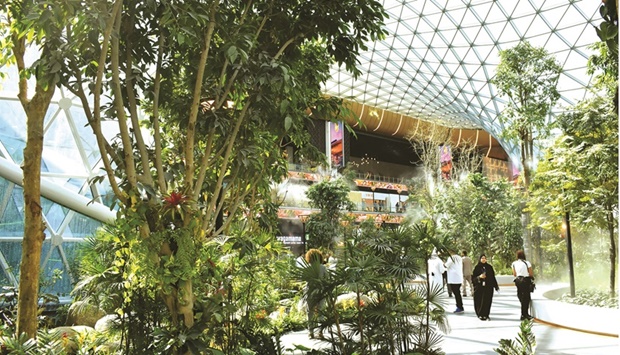Hamad International Airport (HIA) ‘Phase A’ expansion will cater to 58mn passengers annually, Qatar Airways Group Chief Executive HE Akbar al-Baker said yesterday. He noted that ‘Phase B’ of expansion, which is set to commence in early 2023 will further increase capacity to more than 70mn passengers annually.
The newly expanded terminal encompassed a total of nine projects, which includes Central Concourse – The Orchard, retail & F&B, Oryx Garden Hotel and North Plaza Lounges, Al Mourjan Business Lounge, Remote Transfer Baggage Facility (RTBF) building and system, Virtual Air Traffic Control Tower, Western Taxiway and Stand Development works, Western Fuel Farm and Midfield Fuel Farm expansion works and Cargo Bridging. With sustainability at the core of HIA’s plans, the airport has managed to have four of the expansion projects achieve a 4-star rating under the Global Sustainability Assessment System (GSAS) from Gulf Organisation for Research & Development (Gord). This includes the Orchard, Oryx Garden Hotel & north plaza lounges, Al Mourjan Business lounge – the Garden and the Remote Transfer Baggage Facility.
HIA Phase B expansion will increase capacity to more than 70mn passengers and include new concourses and cargo terminal. New Concourses: a 95,000sq m plus extension of Concourses D & E to fulfil the final expansion of the passenger terminal connecting to the Orchard and converting adjacent remote aircraft stands to contact gates. A new western Satellite Concourse of approximately 300,000sq m converting the 34 remote aircraft stands to contact gates with an automated people mover connection to passenger terminal.
New Cargo Terminal 2 (CT2) will be a dedicated transfer cargo facility designed to handle 3.3mn tonnes per annum. It will be located on a 300,000sq m plot beside the existing Cargo Terminal in the HIA Midfield Area with a built-up area of circa 240,000sq m divided over three material handling floors and four office floors.

HIA’s ‘Orchard’ u2014 an indoor tropical garden that has sourced 300-plus trees and 25,000 plants from sustainable forests around the world. PICTURE: Thajudheen

